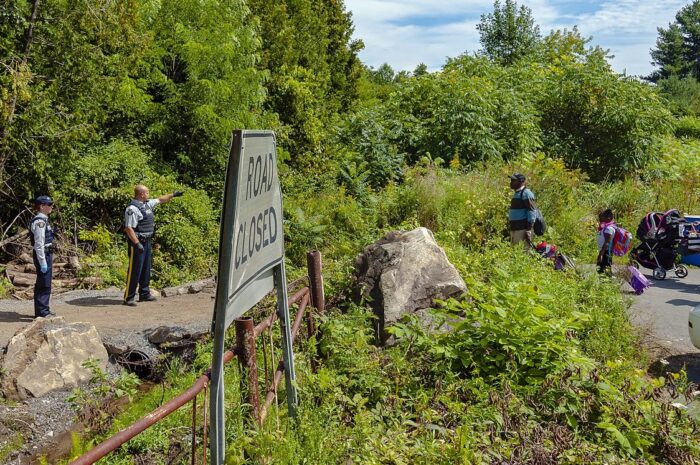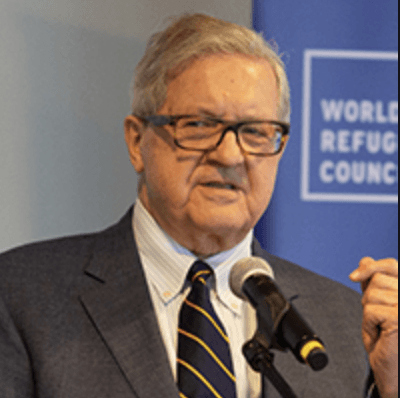By Lloyd Axworthy and Allan Rock
Lloyd Axworthy is Chair of the World Refugee & Migration Council and Allan Rock is a Special Adviser to the World Refugee & Migration Council.
This article was originally published in The Globe and Mail.
As Canadians, we take pride in our well-deserved reputation as a caring society that offers a humane and generous response to those seeking asylum. Yet last week, the Supreme Court of Canada heard arguments that since 2004, Canadians have been complicit in the mistreatment of refugees arriving at our border from the United States.
At the heart of this issue is the 2004 Canada-U.S. Safe Third Country Agreement (STCA), which requires that refugee claimants seek protection in the first country in which they arrive, be it Canada or the United States. On a practical level, this means that a person seeking asylum from a country other than Canada or the U.S. cannot seek protection in Canada if they have already landed in the U.S., and vice-versa. For the past 18 years, the STCA has operated on the premise that both countries are “safe” for refugees.
In July, 2020, a federal court judge determined that the STCA is unconstitutional and that Canada’s treatment of STCA returnees violates those provisions of our Charter of Rights and Freedoms that guarantee liberty and security of the person. The Federal Court of Appeal took a different view and upheld the STCA. Hence, the matter is now before our highest court for a final decision.
The problem here is not the agreement itself. In fact, similar arrangements have succeeded when all participating countries truly offer safety to asylum seekers. Instead, the problem is that the fundamental premise of the STCA no longer holds true. Put simply, the United States is not safe for many refugees. As a result, there are two distinct reasons why, in our respectful view, the Supreme Court should strike down the STCA.
First, while it is not the Court’s role to judge another country’s legal system, this case asks the Court to ensure that people who seek protection in Canada are not sent back to unjustifiable risk and real harm. Yet in returning people to foreseeable consequences in the U.S. – namely, detention in deplorable conditions and a serious risk of return to persecution – that is exactly what is occurring.
In the evidence before the Court, there are numerous examples of asylum seekers who were jailed in the U.S. after being turned away from Canada. They include a family with toddlers who were forbidden from sleeping with their parents; people kept for long periods in solitary confinement; and a 50-year-old woman forced to bathe naked in full view of security personnel.
Those who we send back to be detained in the U.S. face enormous barriers in claiming protection, leading some to be deported and persecuted in their home country. For example, the evidence in the case before the Court includes testimony from a Sri Lankan man who was turned away from Canada and then detained for a year and a half in the U.S. He was then deported and faced the exact persecution he feared – detention, interrogation and beatings by Sri Lankan authorities.
Second, our government has not been respecting the limits created by our own domestic laws. Canadian law implementing the STCA requires that our government monitor circumstances in the U.S. and only continue its designation as “safe” when it truly is. Here, the Court will hear the argument that Canada has neither adequately monitored what’s happening in the U.S. nor responded effectively to what it has seen. Given these circumstances, the Court will be asked to intervene.
Although Donald Trump is no longer in power, the reality for too many refugee claimants in the U.S. remains terrifying. We are by now all too familiar with last year’s images of U.S. border patrol agents on horseback chasing down Haitian migrants. And four years after the implementation of a disastrous policy at the U.S.-Mexico border that separated children from their parents, many are yet to be reunited. Immigration detention conditions in the U.S. remain deplorable, with staggeringly high rates of sexual assault and racially motivated attacks. Is Canada not properly monitoring these developments, or have we grown complacent in turning a blind eye to them? In either case, the STCA can no longer be allowed to stand.
It is important to note that even if the STCA is declared invalid, asylum seekers will still have to establish that they qualify for refugee status under international law. But they will no longer be automatically deemed ineligible for that status merely because they crossed into Canada from the United States.
It is said that the measure of a society is how it treats those on its margins. When vulnerable asylum seekers arrive at our border, they deserve to be treated lawfully and with dignity. We can no longer assume that if we send them back to the U.S., they will be safe. Indeed, the evidence establishes the contrary. It is time for us to abandon the STCA, an agreement no longer worthy of its name.
Image: Asylum seekers attempt to cross into Canada from the United States at Roxham Road, Quebec. (Daniel Case/Wikimedia Commons)


